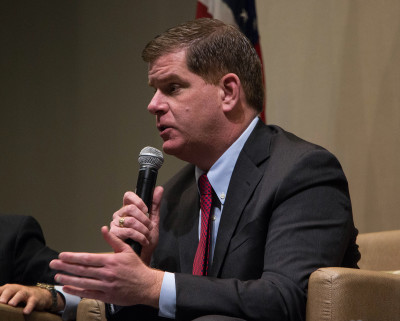 Given his experience battling similar issues within his own city, Boston Mayor Martin Walsh was named chair of a nationwide task force on substance abuse, prevention and recovery services.
Given his experience battling similar issues within his own city, Boston Mayor Martin Walsh was named chair of a nationwide task force on substance abuse, prevention and recovery services.
The task force is supported by the United States Conference of Mayors and its president, Baltimore Mayor Stephanie Rawlings-Blake, according to a Thursday press release. The mayors partaking in the conference will concentrate on the effect of substance abuse on cities and look to find more effective ways to prevent and treat substance abuse.
“With the ongoing opioids crisis, too many individuals and families are all too familiar with the destruction that substance abuse causes in our homes, workplaces and on our streets,” Walsh said in the release. “I look forward to teaming up with Mayors from across the country to make sure recovery services are readily available to those who need it, and develop strategies to overcome this public health crisis.”
City leaders, health officials and advocates have been actively fighting substance abuse in Boston, Walsh said, citing a report on substance abuse the city released with the Blue Cross Blue Shield of Massachusetts as well as celebrations for National Recovery Month.
Walsh recently spoke on a panel with Democratic presidential candidate Hillary Rodham Clinton and Massachusetts Attorney General Maura Healey about addressing substance abuse, The Daily Free Press reported Oct. 2.
Matthew Hoffman, program director of the outpatient treatment center Boston Alcohol and Substance Abuse Programs, said Walsh’s previous experiences make him a good candidate to lead the task force.
“He’s certainly knowledgeable professionally [and] personally,” Hoffman said, “and he’s a good spokesman, so it’s great.”
Hoffman emphasized that substance abuse is an ongoing problem in Boston.
“This whole opioid crisis and overdose crisis, people get the idea that it just happened today when it’s been going on for a long, long time,” Hoffman said. “It’s an ongoing problem and it’s fantastic that we’re finally giving it the attention it deserves.”
Residents of Boston commented on the city’s initiative to end addiction.
Renee Georgopolis, 35, of the North End, said those who struggle with addiction should be able to get easy access to help.
“There are some people out there who want the help but can’t afford the help. They want to get better but they feel like they have no options,” she said. “They have to work a bit to get the benefits, but they should [be able to].”
Rob Diamond, 26, of Brighton, said treatment should ultimately be offered to all citizens who have faced a problem.
“The government needs to be there for certain people but I think if they have the availability to pay for it, they shouldn’t be a burden on others because of their poor choices,” he said. “But some people had a mental disposition or a family situation that led them up to [addiction], and if that has put them in a situation where they can’t afford treatment and they need a government program, then that absolutely should be the case.”
Jack Schuleman, 20, of Allston, was concerned that the taskforce might focus too much on putting substance abusers behind bars instead of helping them toward recovery.
“I hope that the taskforce goes with the route of treating the abuse as more of a mental illness instead of a ‘you’ve abused the drug, now you’re going to jail’ type of situation,” he said. “I hope they help the people who are stuck in the cycle of drug abuse. We’ll see how it goes.”
Kennedy serves as a city associate for the Daily Free Press. A freshman, she studies English with a minor in philosophy. As a journalist, Kennedy shows special interest in crime and local politics. You can follow her on Twitter at @stellarkenn.




